- Homepage
- Our green garden
- End of Winter Chores
End of winter chores
End of winter chores means climbing up ladders to clean the gutters if you want pristine rainwater for your tanks and the underground-reservoir.
Pristine, free rainwater
This spring I was caught out. General busyness meant it didn't get done timeously; the first sign was a not entirely pleasant odour of decaying humus in the shower long before we tasted anything. I literally scooped up half a barrow-load of muck from the gutters; and had to syphon out and waste much of the reservoir water.
Clean the gutters
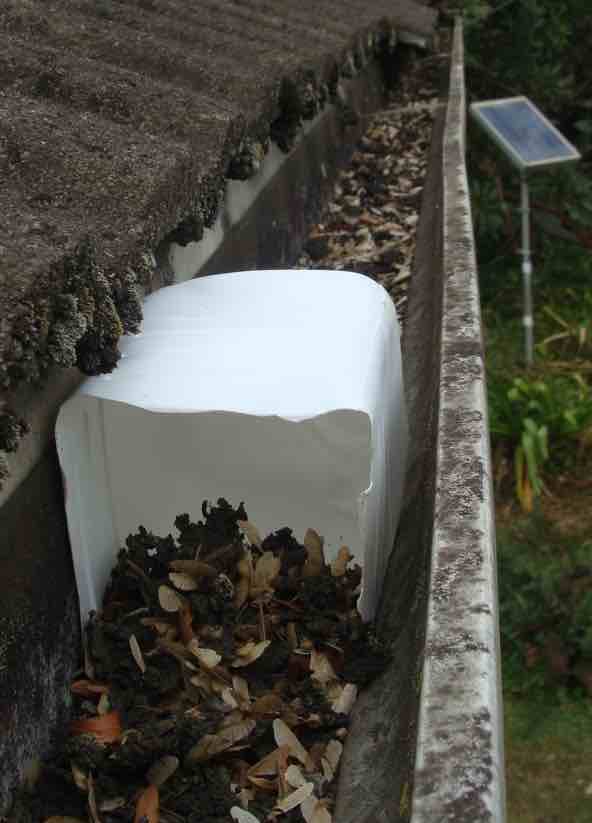
It’s now several months since we have had rain; and most likely your tanks and reservoirs are low too. It is time to roll up your sleeves and clean them out. It is not a pleasant chore but must be done if we want clean, potable-water when the spring mists and summer storms arrive.
The place to start is with the gutters; it’s definitely my least favourite Saturday afternoon job but they are filled with autumn leaves that will soon give your water a greenish tinge and an unpleasant smell.
Make sure the ladder is on stable ground and preferably have someone hold it. Take up a bucket, various paddles and a cut-off two litre milk jug to scoop up any sludge; it makes great humus for the garden.
There are various leaf-traps that will protect your gutters; I must look into them.
Flush out the tanks
One of the joys of a fibreglass-tank is that they come with a plug at the base that you can unscrew and most of the gunge will pour out with no effort; plastic may be more difficult. Slosh it out with a hosepipe to get it clean; obviously you save as much as possible for the garden.
That reservoir too
The most difficult is the reservoir, if you are privileged to have one. A hired-pump with a large throat that will suck up all the debris would make life a lot easier. Then you simply have to use various squeegees and buckets to clean out any decomposed leaves and other fine material that has settled at the bottom.
A five-litre ice cream container is useful for scraping up the sludge. It takes me a couple hours; once every two years, so one can’t complain considering the abundant rainwater harvest that makes us independent of the vagaries of almost all South African municipalities. Day Zero may be just around the corner.
Even in Cape Town undoubtedly the best-run municipality, the water from the huge reservoirs has a lot of organic material; combined with chlorine it forms toxic THMs.
Post-chlorination woes are something that greenies who harvest rainwater can avoid.
Solar panels, vacuum tubes and pressure-release valves
Clean those solar panels and vacuum tubes during the dry and dusty season; all that crud certainly affects their performance.
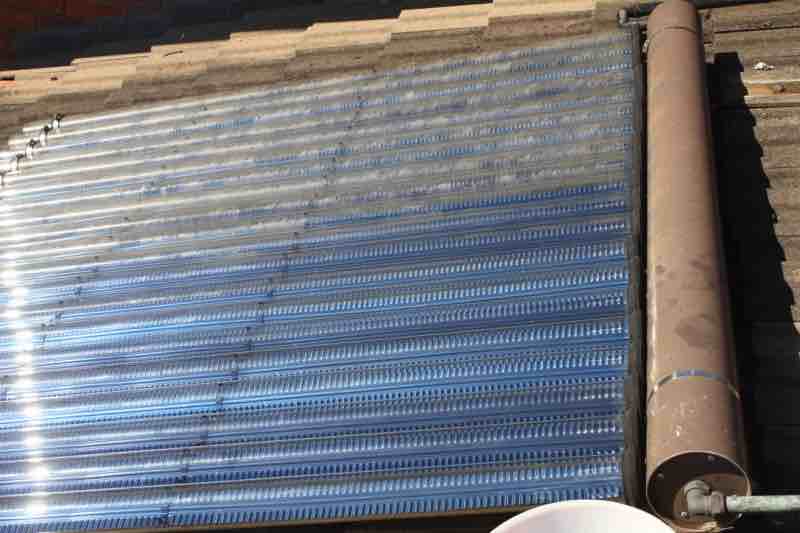
Whilst cleaning those vacuum tubes, take a moment to measure the drip rate from the pressure-release valve; you need a watch and measuring cylinder. They do need to be replaced periodically; it should be no more than 2 litres per day.
It's the hot water that drips out. Do you have the feeling the solar tubes are not performing for some reason? Check the pressure-release valve at least once or twice a year.
Harvest the black gold
This is the time to open the compost-heaps, and get all that "black gold" into the garden in readiness for spring; we let the hens mull it over, pecking out the cutworms and other larvae.
We do our best to save the earthworms which are returned to the compost heap. A bakkie-load of cow or chicken manure does wonders too.
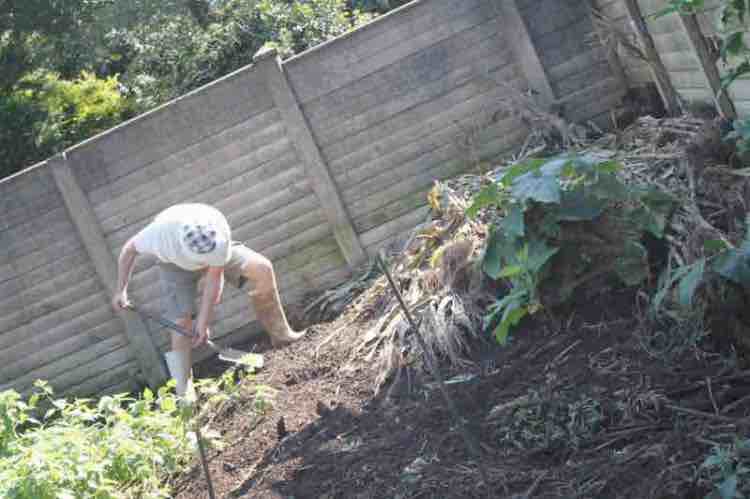
If you are planning to raise chicks this is the time to get the nesting boxes in readiness; you will soon have a broody-hen or two. It needs to be placed close to the rest of the flock but separate so she is not disturbed by the other birds; it must be secure at night so that the uchakide won’t attack them. I like that Zulu word but not the creature; the mongoose is a devil if you keep fowls.
We could go on about pruning the hydrangeas and roses but I will leave that for the gardening columns; it’s a busy time around every green home.
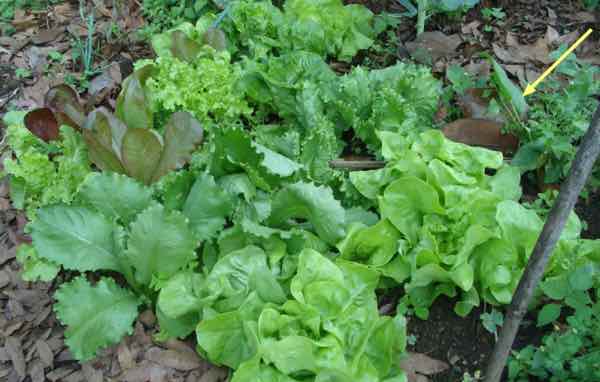
Hopefully you are reaping baskets of fresh-peas, carrots and radishes; and even the peppadews are still thriving. Lettuce, kale and spinach are at their best.
Many of human wellness problems are associated with our increasingly sedentary lifestyles; you have the choice of pumping-iron at the gym, lifting buckets of gunge or turning compost heaps. For my part, I would choose the garden; I like to see something visible achieved after all that effort.
Prepare the beds for potatoes
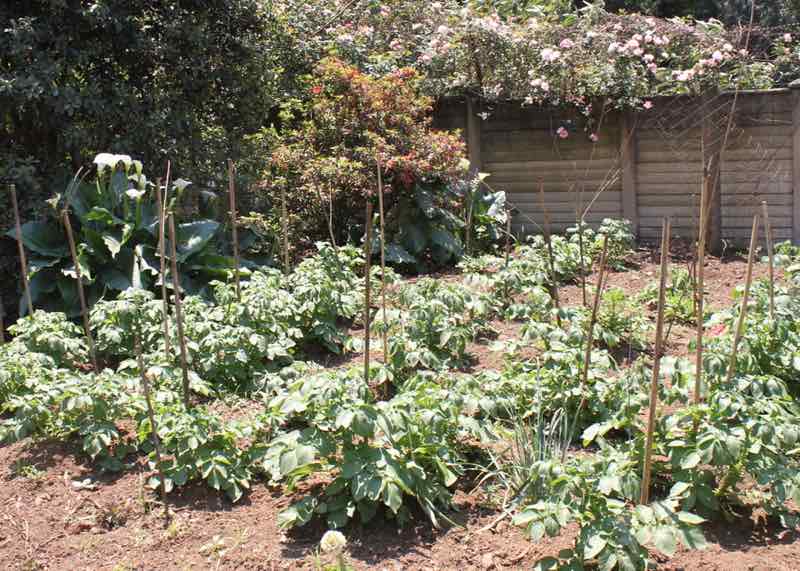
Preparing the ground for potatoes is one my chores lined up for the end of winter; the seed should be planted as soon as the danger of frost is over. Place old maize-stalks at the bottom and a spadeful of compost ensures a better harvest.
Planting potatoes is not for the faint-hearted; each hole needs to be at least a foot deep. We no longer dig trenches as the moles may then have a field day. A stake in each keeps the leaves off the ground and makes it easier to heap them up.
Last winter I had access to a 15 bakkie loads of mulch from cleaning up our church car-park that had become overgrown. We had a stunning crop of potatoes, nearly half a ton from a suburban garden.
New potatoes don't cause a spike in blood glucose like those from cold-storage; they taste so much better in any case, just like all fresh veggies.
End of winter chores
End of winter chores at our green home include opening the compost-heap which can be tiresome but done mindfully is really not such a bother. Barrowing the humus around the garden is quite hard work though.
More recently we have been experimenting with raised garden beds; hard work initially but then no barrowing and an astonishing harvest.
It's a busy time requiring some planning and lots of energy. No one ever promised an easy ride when determined to stay well, get plenty of exercise and wonderful fresh food.
You're contributing to saving the planet too; capturing CO2 from the atmosphere.
When browsing use right click and "Open Link in New Tab" or you may get a bad gateway signal.
The material expressed on this page is gleaned from the nutritional and environmental literature; it is clearly referenced. A plain distinction is made between the author's opinion and that which is scientifically proven. When in doubt consult your health professional.
To suggest a correction or clarification, write to Dr Bernard Preston here. Contact.
Newsletter
Our newsletter is entitled "create a cyan zone" at your home, preserving both yourself and Mother Earth for future generations; and the family too, of course. We promise not to spam you with daily emails promoting various products. You may get an occasional nudge to buy one of my books.
Here are the back issues.
- Lifestyle and ideal body weight
- What are ultra-processed foods?
- Investing in long-term health
- Diseases from plastic exposure
- Intensive lifestyle management for obesity has limited value
- A world largely devoid of Parkinson's Disease
- The impact of friendly bacteria in the tum on the prevention of cancer
- There's a hole in the bucket
- Everyone is talking about weight loss drugs
- Pull the sweet tooth
- If you suffer from heartburn plant a susu
- Refined maize meal and stunting
- Should agriculture and industry get priority for water and electricity?
- Nature is calling
- Mill your own flour
- Bake your own sourdough bread
- Microplastics from our water
- Alternative types of water storage
- Wear your clothes out
- Comfort foods
- Create a bee-friendly environment
- Go to bed slightly hungry
- Keep bees
- Blue zone folk are religious
- Reduce plastic waste
- Family is important
- What can go in compost?
- Grow broad beans for longevity
- Harvest and store sunshine
- Blue zone exercise
- Harvest and store your rainwater
- Create a cyan zone at your home
Did you find this page interesting? How about forwarding it to a friendly book or food junkie? Better still, a social media tick would help.
- Homepage
- Our green garden
- End of Winter Chores
Address:
56 Groenekloof Rd,
Hilton, KZN
South Africa
Website:
https://www.bernard-preston.com